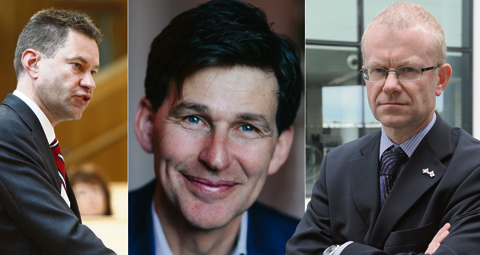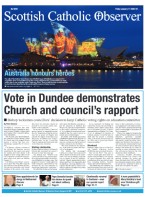BY Ian Dunn | August 11 2017 | ![]() 0 COMMENTS
0 COMMENTS ![]() print
print

Banker’s bizarre plan for state control of religion
Publication Date: 2017-08-11
MSPs condemn Creative Scotland head’s comments on women priests. - By IAN DUNN
The millionaire investment banker who heads up Scotland’s national art agency has been accused seeking ‘state control of religion.’
Ben Thomson, chair of Creative Scotland, has written to the Scottish Government urging them to legally force Catholics and Muslims to accept female priests and imams.
In a private submission to the Scottish Government he said: “There seems to be a huge focus by politicians and media on the importance of the number of women in cabinet or corporate boards but there is little mention that there are no female Catholic priests or mullahs.
“Most of the religions practised in the UK to some extent discriminate on the basis of gender and it is time we stopped supporting this exemption in our legislation.”
The Equality Act 2010 includes an exemption from a general prohibition on gender discrimination if employment is for the purposes of an organised religion.
Although equality legislation of this kind is not devolved to the Scottish Government, Mr Thompson said they should lobby for those powers.
If religious groups like Catholics and Muslims want to ‘assimilate’ into our society, he said, then they should also accept that there is ‘a set of ethics that include prohibiting gender discrimination that should form the basis of every part of our society, including religion.’
Mr Thomson, said that having women as religious leaders would help to integrate the culture of faith groups into ‘the ethics of our culture in Scotland.’
He added that the abuse scandal in the Church and sexual grooming of young women in the Midlands by Muslim men were down to ‘lack of women as part of the leadership in religion.’
Conservative MSP Murdo Fraser said on Twitter: “I like Ben Thomson, and am neither Catholic nor Muslim, but this is just bonkers.”
SNP MSP John Mason, convener of the Freedom of Religion and Belief group at the Scottish Parliament, put down a motion marking the ‘important traditional separation of Church and religion and state in Scotland.’ He calling Mr Thomson’s comments an ‘unreasonable interference in the operation of religious life in Scotland,’ and said he ‘hopes that the separation of state and religion will continue to be respected.’
“The serious side of this is some people, some of my colleagues in parliament, will also think this, will believe the government should organise the Church just like it organised anything else,” Mr Mason told the SCO. “And that’s a very dangerous road to go down. We can’t have the state dictating to religious how they run their affairs.”
A Scottish Catholic Church spokesman described Mr Thomson’s comments as ‘ill-informed and poisonously anti-religious.’ “Religious life is not a workplace,” he said. “To suggest otherwise is to demonstrate a lamentable ignorance of religion and belief.
“To ascribe blame for gender imbalance to two minority groups— Catholics and Muslims—in a society which is almost entirely secular is close to laughable. These opinions seriously call into question Mr Thomson’s judgment and cast doubt on his suitability as chair of our national arts body.”
Omar Afzal, a spokesman for the Muslim Council of Scotland, an organisation that has three women on its executive board, said that he was ‘disgusted’ by the remarks which were ‘derogatory, out of date and unfounded.’
Mr Thompson was responding to a Scottish Government consultation on a bill that would require men and women to be represented equally in public sector boardrooms. Mr Thompson’s response also said there was no need to mandate for equal representation on public sector boards.
A spokesman for the Scottish Government said: “Scotland is a forward thinking country with equality at its very heart and we do not tolerate any prejudice in any form. The nature of public consultation means we receive a wide range of views from individuals and organisations.”










